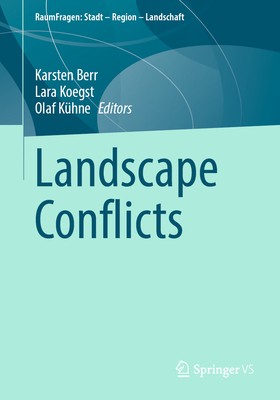
- We will send in 10–14 business days.
- Publisher: Springer vs
- ISBN-10: 3658433515
- ISBN-13: 9783658433512
- Format: 17 x 25.2 x 2.5 cm, minkšti viršeliai
- Language: English
- SAVE -10% with code: EXTRA
Landscape Conflicts (e-book) (used book) | bookbook.eu
Reviews
Description
Landscape conflicts, for example in connection with / in view of the energy transition, climate policy, transport policy, nature conservation, the extraction of mineral raw materials, the design of urban landscapes or tourism are potentially associated with high economic, social and political costs even before a possible escalation. It is therefore undoubtedly useful to gain a better understanding of landscape-related conflicts in terms of their causes, their course, their dynamics, their inherent logic and possible regulatory procedures. Frequently, such conflicts manifest themselves in particular in different claims and aspired or arrogated interpretative sovereignties concerning what can or may be considered together as 'landscape' (here understood as a special case to 'space'), and these conflicts are not limited to the economic dimension, but they also ignite in social, political and cultural, often also in aesthetic and moral questions. The contributions to this anthology therefore focus on the question of how landscape conflicts can be seen as a productive social normality and be brought to a non-violent and not necessarily consensual settlement.
EXTRA 10 % discount with code: EXTRA
The promotion ends in 22d.14:16:25
The discount code is valid when purchasing from 10 €. Discounts do not stack.
- Publisher: Springer vs
- ISBN-10: 3658433515
- ISBN-13: 9783658433512
- Format: 17 x 25.2 x 2.5 cm, minkšti viršeliai
- Language: English English
Landscape conflicts, for example in connection with / in view of the energy transition, climate policy, transport policy, nature conservation, the extraction of mineral raw materials, the design of urban landscapes or tourism are potentially associated with high economic, social and political costs even before a possible escalation. It is therefore undoubtedly useful to gain a better understanding of landscape-related conflicts in terms of their causes, their course, their dynamics, their inherent logic and possible regulatory procedures. Frequently, such conflicts manifest themselves in particular in different claims and aspired or arrogated interpretative sovereignties concerning what can or may be considered together as 'landscape' (here understood as a special case to 'space'), and these conflicts are not limited to the economic dimension, but they also ignite in social, political and cultural, often also in aesthetic and moral questions. The contributions to this anthology therefore focus on the question of how landscape conflicts can be seen as a productive social normality and be brought to a non-violent and not necessarily consensual settlement.


Reviews